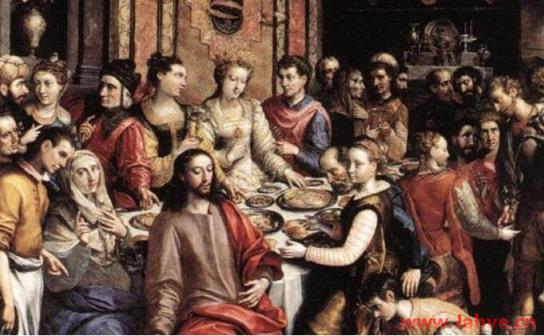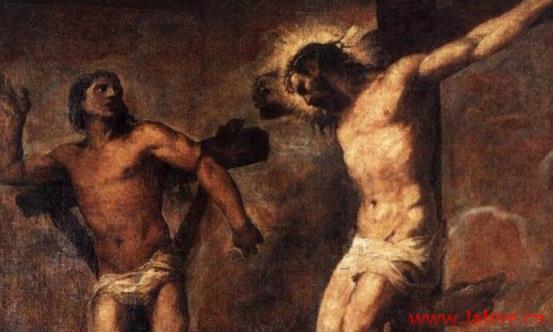
原文|Bishop Barron
翻译|Carrie2017-8-18 朋友们,在今天的福音中,耶稣讲授婚姻是神圣和永久的。于是,我们开始明白为什么夫妻的爱是天主之爱的圣事。圣父和圣子在各自保持独立性的同时把自己完全奉献给对方,而这种相互奉献就是圣神。因此,当两个人因为爱走到一起并成为一体,他们仿效着圣父和圣子之间的爱。而当他们生育孩子,这个新生命极其神圣地仿效着圣神的一呼一吸。父亲、母亲和孩子形象生动地体现了圣父、圣子和圣神。这就是为什么耶稣说到婚姻时的语气是如此强硬,也是为什么教会古往今来以最好的方式一直重复着耶稣的话。因为婚姻是如此神圣,所以教会始终那么孜孜不倦地保卫着它。我知道天主教会因为围绕婚姻和性订立了诸多规定而声名狼藉。我明白自古以来自由主义者不断反对所谓的天主教会极端保守的道德主义。但想想看:人类向来都会围绕珍贵的东西去制定法律、限制和禁令。Friends, in today's Gospel Jesus teaches about the sanctity and permanence of marriage. Now we begin to see why the love of a husband and wife is a sacrament of God's love. The Father and the Son—while remaining distinct—give themselves utterly to each other, and this mutual giving is the Holy Spirit.So when two people come together in love and form one flesh, they mimic the love between the Father and the Son. And when their love gives rise to a child, this mimics sacramentally the spiration of the Holy Spirit. Father, mother, and children are evocative of the divine Father, Son, and Holy Spirit.And this is why Jesus speaks so forcefully about marriage, and why his Church, at its best, has echoed him up and down the centuries. It is because marriage is such a sacred sign that the Church has sought so assiduously to protect it.I know that the Church gets a bad rap for surrounding marriage and sexuality with so many rules. I realize that libertarians through the ages have fought against the supposed uptight moralism of the Church. But look: human beings always surround precious things with laws, restrictions, and prohibitions.2017-8-17
朋友们,在今天的福音中,耶稣讲授婚姻是神圣和永久的。于是,我们开始明白为什么夫妻的爱是天主之爱的圣事。圣父和圣子在各自保持独立性的同时把自己完全奉献给对方,而这种相互奉献就是圣神。因此,当两个人因为爱走到一起并成为一体,他们仿效着圣父和圣子之间的爱。而当他们生育孩子,这个新生命极其神圣地仿效着圣神的一呼一吸。父亲、母亲和孩子形象生动地体现了圣父、圣子和圣神。这就是为什么耶稣说到婚姻时的语气是如此强硬,也是为什么教会古往今来以最好的方式一直重复着耶稣的话。因为婚姻是如此神圣,所以教会始终那么孜孜不倦地保卫着它。我知道天主教会因为围绕婚姻和性订立了诸多规定而声名狼藉。我明白自古以来自由主义者不断反对所谓的天主教会极端保守的道德主义。但想想看:人类向来都会围绕珍贵的东西去制定法律、限制和禁令。Friends, in today's Gospel Jesus teaches about the sanctity and permanence of marriage. Now we begin to see why the love of a husband and wife is a sacrament of God's love. The Father and the Son—while remaining distinct—give themselves utterly to each other, and this mutual giving is the Holy Spirit.So when two people come together in love and form one flesh, they mimic the love between the Father and the Son. And when their love gives rise to a child, this mimics sacramentally the spiration of the Holy Spirit. Father, mother, and children are evocative of the divine Father, Son, and Holy Spirit.And this is why Jesus speaks so forcefully about marriage, and why his Church, at its best, has echoed him up and down the centuries. It is because marriage is such a sacred sign that the Church has sought so assiduously to protect it.I know that the Church gets a bad rap for surrounding marriage and sexuality with so many rules. I realize that libertarians through the ages have fought against the supposed uptight moralism of the Church. But look: human beings always surround precious things with laws, restrictions, and prohibitions.2017-8-17 朋友们,今天的福音集中讨论宽恕的给予。这是《圣经新约》的顶梁之柱,也是耶稣的传道工作和布道的核心。当别人得罪我们,我们所有人都成了正义的化身。当有人伤害我们,我们会记住他们的每一种侮辱、每一次冷落、每一个缺点。因此,即使是要我们宽恕别人一两次都是那么困难。伯多禄提出要宽恕七次已经够出格了,但耶稣却对他说,“我不对你说:直到七次,而是到七十个七次。” 换句话说,我们要时时刻刻、持续不断、不计次数地宽恕别人。你的整个人生都必须成为一种宽恕行为。因而,耶稣说了今天福音中的比喻。欠了大笔债务而被宽恕的仆人至少应该宽恕那个欠了他小量债务的同伴。这个比喻的精神核心在于:无论别人欠了你什么(在严格意义上的公正),比起天主给你的仁慈恩赐,都是微不足道的;无论你需要宽恕的是什么,比起天主给你的神圣宽恕,都是微乎其微的。我们人生的全部意义在于成为天主的生活、恩宠、宽恕和平安的工具。我们要让天主已经倾注于我们之内的一切通过我们流向人间——我们这辈子要做的仅此而已。Friends, our Gospel today focuses on the gift of forgiveness. This is such an anchor of the New Testament, and so central to Jesus’ ministry and preaching. When it comes to the offenses that we have received from others, we are, all of us, great avatars of justice. We will remember every insult, every snub, and every shortcoming, when it comes to our being hurt by others. That’s why forgiving even once or twice is so difficult.Forgiving seven times, as Peter suggests, is beyond the pale. Yet Jesus says to him, “I say to you, not seven times but seventy-seven times.” In other words, forgive constantly, relentlessly, without calculation. Your whole life must become an act of forgiveness.And this is why Jesus tells the parable in today’s Gospel. The man who had been forgiven so much should, at the very least, show forgiveness to the one who owed him so much less.Here is the spiritual heart of the matter: whatever anyone owes you (in strict justice) is infinitely less than what God has graciously given to you; the divine forgiveness of you is infinitely greater than any forgiveness you might be called upon to offer.Becoming an instrument of God’s life, grace, forgiveness, and peace is what it is all about. Allow to flow through you what has been poured into you—that is the whole story.
朋友们,今天的福音集中讨论宽恕的给予。这是《圣经新约》的顶梁之柱,也是耶稣的传道工作和布道的核心。当别人得罪我们,我们所有人都成了正义的化身。当有人伤害我们,我们会记住他们的每一种侮辱、每一次冷落、每一个缺点。因此,即使是要我们宽恕别人一两次都是那么困难。伯多禄提出要宽恕七次已经够出格了,但耶稣却对他说,“我不对你说:直到七次,而是到七十个七次。” 换句话说,我们要时时刻刻、持续不断、不计次数地宽恕别人。你的整个人生都必须成为一种宽恕行为。因而,耶稣说了今天福音中的比喻。欠了大笔债务而被宽恕的仆人至少应该宽恕那个欠了他小量债务的同伴。这个比喻的精神核心在于:无论别人欠了你什么(在严格意义上的公正),比起天主给你的仁慈恩赐,都是微不足道的;无论你需要宽恕的是什么,比起天主给你的神圣宽恕,都是微乎其微的。我们人生的全部意义在于成为天主的生活、恩宠、宽恕和平安的工具。我们要让天主已经倾注于我们之内的一切通过我们流向人间——我们这辈子要做的仅此而已。Friends, our Gospel today focuses on the gift of forgiveness. This is such an anchor of the New Testament, and so central to Jesus’ ministry and preaching. When it comes to the offenses that we have received from others, we are, all of us, great avatars of justice. We will remember every insult, every snub, and every shortcoming, when it comes to our being hurt by others. That’s why forgiving even once or twice is so difficult.Forgiving seven times, as Peter suggests, is beyond the pale. Yet Jesus says to him, “I say to you, not seven times but seventy-seven times.” In other words, forgive constantly, relentlessly, without calculation. Your whole life must become an act of forgiveness.And this is why Jesus tells the parable in today’s Gospel. The man who had been forgiven so much should, at the very least, show forgiveness to the one who owed him so much less.Here is the spiritual heart of the matter: whatever anyone owes you (in strict justice) is infinitely less than what God has graciously given to you; the divine forgiveness of you is infinitely greater than any forgiveness you might be called upon to offer.Becoming an instrument of God’s life, grace, forgiveness, and peace is what it is all about. Allow to flow through you what has been poured into you—that is the whole story.

微信小程序
微信扫一扫体验

微信公众账号
微信扫一扫加关注
顶部
